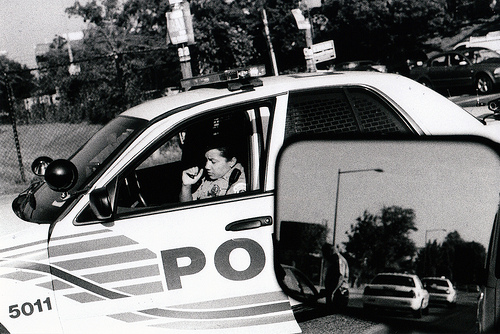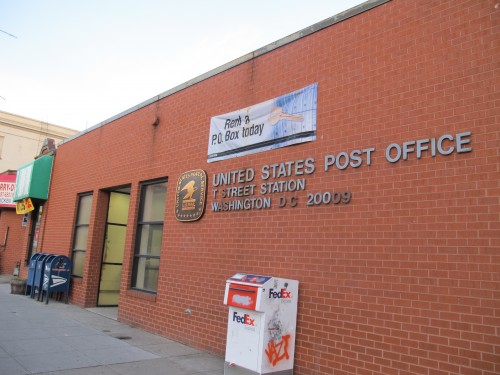
Photo by PoPville flickr user AWard Tour
A couple of weeks ago we discussed what questions should be asked of Chief Lanier and other MPD leaders at a crime meeting. Ed. Note: Many police officers and firefighters read PoP and from time to time contact me directly. This one was kind enough to give his/her opinion from the ground level. The following is her/his opinion alone and does not represent an official response from MPD.
It is a bit lengthy but I think well worth the read:
“How come in my over 13 years in DC I’ve only seen cops on foot a handful of times? Simply, why don’t we see regular patrols on foot?
* It depends on the district and the PSA Lieuntenant. Some districts or PSAs aren’t conducive to having a footbeat officer. Foot or bike beats are more logical for business areas than residential ones, which is why you don’t see them in heavy residential neighborhoods.
* The advent of statistics-driven policing has put a lot of pressure on supervisors. One of the metrics that officials look at come from the Office of Unified Communications (OUC). They look at things like the number of calls for service, response time, etc. A lot more calls get answered in a shorter amount of time when Officers are in vehicles. When you take a fixed pool of manpower and reassign some to fixed, limited-geography beats, the response time for everything is going to drop into the toilet unless you augment the foot officers with additional officers in vehicles.
* Given a choice between walking and pushing a scout car, most officers won’t willingly volunteer for a foot or mountain bike beat. Assigned foot beats are usually pretty small and get repetitive fast. Walking or biking eight and half hours a day can take a toll on your body.
Continues after the jump.
A quick aside, when I was walking home Thurs. afternoon I saw fresh gang graffiti on a pole near a recent shooting. I saw an MPD patrol car drive by and I stopped it. While the officer was extremely kind and attentive, I asked if they realized that there was gang graffiti here? They did not. Like I said, they were very attentive in writing down the info but my point is, if you are only riding around in a patrol car you are going to miss a lot of details.
o When you’re driving around, gang graffitti rapidly becomes like static because we’re looking for people, not tags. Graffitti can be telling sometimes in figuring out if there are new groups coming up, but D.C. crews are, from my experience, small and localized with the same idiots doing the same crime all the time.
o Officers get a lot more actionable ‘intel’ by pressing people out, IDing them, photographing them, etc. than looking at paint on the walls.
I would also be curious if bluntly asked – does she see the problem of youth gangs/crews getting better, staying the same or getting worse
o In my opinion, crime is getting better but youth crime is getting worse.
o Juveniles in D.C. just don’t give a shit about the police, jail, or anything else because if they’ve been locked up once, they know that the juvenile justice system is a joke and that nothing is going to happen to them. I’ve talked to them, and most of know that they’ll get a slap on the wrist even if a case proceeds against them.
If not getting better – what can MPD do in the long term that is a preventative measure rather than simply reactive measures?
o As for what the police can do, the best we can do is try to build some bridges to the good youth who aren’t automatically acculturated to hate the police.
o The bulk of preventative measures need to be concentrated on fixing the family structure of a large minority of D.C. residents. Like it or not, the more intact your family is (i.e. having a mother and father that are still together and involved with their kids), the less likely that a juvenile is to get into trouble. The biggest shitbags that we have to deal with are usually the products of teenage mothers who are single and head up the household. Engage the extended families of juveniles if their primary family unit is not intact. It’s telling that a lot of juveniles that I’ve either dealt with or arrested want to call their Aunt or their Grandmother.
caballero: Should we be in regular contact with local patrols?
o Yes you should always feel free to stop and talk to us if you think something is going on. We’re in your neighborhoods 40 hours a week or more, but we’re not everywhere every time. Also, good officers like good intelligence from community members, especially those people who are established in the community and have previously given reliable information or are plugged into a community that we can’t be.
What kind of information are they interested in receiving from us? If we don’t see crimes being committed, but we see suspicious activity or individuals, should we pass that info along?
o I’m glad someone asked this because I’ve tried to talk to citizens about how the 5 Ws are still important when communicating with the police: Who, What, Where, When, and Why. It applies both to intel and for when you call 911 about a specific issue.
o WHO: When you call or e-mail us, have a good description of who you’re talking about. Every report we do has a few boxes that held describe someone. Those are: race, sex, ethnicity, age range, height, weight, build, eye color, hair color, complexion, hair style, scars or tattoos, facial hair, hat, coat, pants, and shirt. When you call about something, take some time out to look at a person and get a good description.
A bad lookout: 3 B/Ms hanging out in the block selling drugs.
A good lookout: 3 B/Ms, one 18 to 20 with a white shirt with orange stripes and red hat, one 20 to 25 with dreads, white shirt and green sneakers and a fat build, one 25 to 30 with a tan jacket, black jeans, clean cut with a thin build and dark complexion.
o WHAT: If you’re calling about suspicious activity, articulate what it is. If it’s the usual call about black men hanging out, that’s not going to help us. If it’s about drug dealing, be specific: Are there hand to hand transactions? People biking or running up to a car repeatedly? Lookouts on foot or bikes? Is there a stash that the dealers might be going to.
o WHERE: Where is the activity that you want to report occurring? intersections are sometimes nice, but like most MPD Officers, I’m trained to locate things by street, block, and cardinal direction. Saying that there’s a suspicious vehicle at J Street and 18th., N.W. is fairly vague. Are you saying it’s the at the intersection? Or is it on one of the streets and down 50 feet but close? You’re always going to get a better response if you say something is occuring in the 1800 block of J Street, N.W., north side, or the west alley of the 1000 block of 18th Street, N.W.. Be specific!
o WHEN: When did the thing you’re calling about occur? For instance, saying you were just robbed doesn’t help because we’re going to bee-line right to wherever you are and the canvasing units are going to start hitting the nearest streets and alleys. If you were really robbed 15 minutes ago, say so because then we’ll have a better idea how far out to canvas. If you’re living on a block with narcotics activity, tell us when it’s happening, i.e. after 9pm, in the mornings, etc.
o WHY: Tell us why you’re calling or e-mailing us. Do you live on the block? They nearby alleyway? Are you calling in as a concerned citizen not willing to be interviewed about the domestic assault occurring next door, or are you a family member getting a call from the victim. Are you the victim of a crime. All that’s important.
If the local crews and their members are so well known to police, why isn’t MPD more aggressively using its powers of search and seizure to get evidence about murders/shootings when these events occur? The probable cause for a warrant is not the most demanding standard, and searches can be authorized for any evidence of a crime (not just, say, the smoking gun), yet rarely do we here about raids on the homes of known crew members believed to be connected to these crimes.
o I’m not a Detective nor a Vice officer, so I’ve never written a search warrant. However, getting a search warrant for someone’s residence is a lot more demanding then even getting an arrest warrant. In general, patrol officers are discouraged from writing up search warrants because they need to be written in such a way that will allow them to stand up in court. Just because you might be able to write a warrant that will stand up to the scrutiny of a judge in chambers doesn’t mean it’ll stand up in trial.
o Search warrants require a different kind of information and are worried about different things than arrest warrants. Yes, P.C. is not an exceptionally demanding standard compared to preponderance of evidence or beyond a reasonable doubt, but that doesn’t make getting a search warrant off something like a simple possession bust easy.
o Remember that the definition of Probable Cause that MPD officers have driven into their heads is: A set of facts, circumstances, or reliable information that would lead a reasonable, prudent, and cautious police officer to believe that a crime has been committed and that a certain person committed it; or that a place to be searched contains the items to be siezed.
What purpose do the laptops installed in patrol cars play, and what – if anything – is being done about using them to surf the web and watch movies. Many times when I walk by a patrol car officers are staring at the things and paying no attention what so ever to what’s happenning around them.
o If I’m in a car, I can usually use my laptop for three things: Getting dispatched calls or dispatch information, running individuals in NCIC or other databases, and writing up reports.
o The idiots playing around on their computers are asking to get hurt or killed one day. It’s going to take a shooting or line-of-duty death to get many officers to stop dicking around on their MDTs.
I want to know why DC is so resistant to the Broken Windows method of law enforcement, when it has been shown to be so effective in other seeminly-intractable communities? What is the objection to improving quality of life while cutting down on petty crime? And does Lanier not “believe” in the results, that less petty crime eventually equals less major crime?
o I’m somewhat of a fan of the broken windows theory, but D.C. is set up to make quality of life crimes a slap on the wrist. If you get locked up for something like public urination or open container, you can elect to forfeit $25 and you’re out. It doesn’t matter how many times you get locked up for that kind of activity because 95% of the time you’re either going to pay out, or you’ll get a citation and not show up to trial. There’s no mechanism in place to punish repeat offenders for these kind of offenses.
o Slightly more serious crimes like assault, theft, defacing property, etc. are usually plead down to time served/probation, or are placed in a deferred prosecution status.
o There’s not enough personnel to process every quality of life arrest and maintain adaquate staffing. If you and half your PSA are out on POCA lockups, shoplifting, etc., there’s not enough people to adaquately cover your beat if something breaks out.
o There’s an element of peer pressure if you’re the officer that’s always processing ‘pissant’ arrests for open container, unregistered auto, etc. instead of being on the street. Nobody is going to look down on you if you locked up the drunk who told you “Fuck You!” instead of pouring out his beer; but if you start doing that kind of thing every day you’re going to look like an officer too scared to do anything else.
o A good number of people locked up on quality of life arrests are pains in the ass. You can lock up Otis the neighborhood drunk, but if you lock him up and he either complains that he wants to go to the hospital for some bullshit reason or for one of the myriad of diseases a life-long boozehound has, you’ll end up tying up three officers: yourself doing the paperwork and two officers to babysit him while you wait for a few hours at the hospital while he gets checked out. A few go-rounds on a hospital detail will deter you from locking up the low-level problem children in your PSA.
What efforts are being made to have cross-jurisdictional enforcement of the laws with the many, many police agencies in town? I’m talking Metro Police, NPS, etc..
o Don’t let many of these agencies fool you in thinking that they can’t enforce D.C. laws. The largest/most visible outside agencies in D.C. (i.e. U.S. Capitol, Secret Service, U.S. Park, Federal Protective Service, F.B.I. Uniform, Metro Transit etc.) can make arrests and enforce D.C. code the same as MPD. Some of them are limited in terms of Jurisdiction
o As a grunt, the main things I’d like to are: the ability to communicate with outside agencies via radio, and for outside agencies to actually come and handle their jurisdiction. Metro Transit is especially egregious in not handing incidents on the Metro and Metrobus. If something goes down on either, it’s not worth having the dispatcher notify them because 95% of the time they’re not going to show up to handle it and they don’t have the people or the vehicles available. U.S. Park is far better and more responsive when it comes to incidents in their jurisdiction.
o Another improvement that could be made to outside agency/MPD communication is having outside agencies be able to access MPD’s reporting system. Right now there’s no little to no ability to easily access information about crime that occurrs in the metro, on federal park land, the Capitol complex, etc.
I’d ask, how many known juveniles are on the street today who were released from DYRS after being caught for violent crimes? Of those how many are located in Anacostia, SW, Shaw, Columbia Heights, Petworth, and Bloomingdale?
o Lots.
o A lot of offenders get dumped in group homes and end up either absconding permenantly or on a regular basis with little to no consequence for failure to adhere to the condiitons or directives imposed by DYRS. The absconder problem with youths in the custody of DYRS (and CFSA) became such a problem that in many districts that I’m aware of no longer dispatch Officers to take absconder reprots and instead direct group homes to call the station to file the report.
o Many offenders are released into the custody of group homes in the same neighborhoods in which they live or grew up in, so the only difference between before they were locked up and after is where the periodically sleep.
o If you knew how many group homes for DYRS wards, CFSA wards, and the mentally ill were operating in many neighborhoods east of the park, your jaw would probably drop.
With regard to how kids get off the rails in the first place, can we talk about truancy? The attendance and drop-out rate at DCPS is disgraceful, yet I see school-aged kids in Chinatown all day and they are never approached by the numerous police. Do police need additional authority to question likely truants? Does DCPS need more truant officers? How many dedicated truant officers are there?
o I personally don’t give a shit about truants because the kids skipping school don’t want to be there in the first place. If they get trucked back to school, they’re either going to leave again or disrupt the classroom for the few students who actually care to try to learn.
o DCPS doesn’t have truancy officers; MPD handles it and usually there’s one officer on daywork assigned to Truancy.
First, with regard to the many juveniles who are already involved in violent crime, is the council prepared to support legislation to establish a public juvenile repeat violent offender registry, to include violent crimes as well as attempted violent crimes and weapons violations?
o The council can start by making juveniles arrested for serious crimes of violence Title 16’d by default (i.e. charged as an adult) and remanded to juvenile court only at the order of an Superior Court judge.
o The council should take a page from D.C. Superior Court Chief Judge Satterfield’s recommendations and take DYRS completely out of the loop when it comes to sentencing. They should also break down the barrier between juvenile sentencing and adult sentencing that prevents offenders from being held beyond their 21st birthday.
o The council should reopen a prison-style Oak Hill to hold violent offenders or juveniles being held pending trial. It doesn’t have to be in Oak Hill; there’s plenty of space at D.C. general for an extra wing at D.C. Jail. Otherwise many offenders get placed at group homes which do nothing to securely hold youth offenders.
o The law and procedure for juvenile offenders needs to be changed so that the OAG can handle juvenile cases like they (or the USAO) handles adult cases i.e. dispensing with the requirement that complainants in juvenile cases have to appear in person at the OAG’s office on the day of a case being papered. A scary number of juvenile cases are dropped because the complainant doesn’t want to appear at 8 or 9 am the day a case is papered. The USAO’s office doesn’t require this in adult cases; why should the OAG?
Recent Stories

For many remote workers, a messy home is distracting.
You’re getting pulled into meetings, and your unread emails keep ticking up. But you can’t focus because pet hair tumbleweeds keep floating across the floor, your desk has a fine layer of dust and you keep your video off in meetings so no one sees the chaos behind you.
It’s no secret a dirty home is distracting and even adds stress to your life. And who has the energy to clean after work? That’s why it’s smart to enlist the help of professionals, like Well-Paid Maids.

Unlock Peace of Mind for Your Family! Join our FREE Estate Planning Webinar for Parents.
🗓️ Date: April 25, 2024
🕗 Time: 8:00 p.m.
Metropolitan Beer Trail Passport
The Metropolitan Beer Trail free passport links 11 of Washington, DC’s most popular local craft breweries and bars. Starting on April 27 – December 31, 2024, Metropolitan Beer Trail passport holders will earn 100 points when checking in at the
DC Day of Archaeology Festival
The annual DC Day of Archaeology Festival gathers archaeologists from Washington, DC, Maryland, and Virginia together to talk about our local history and heritage. Talk to archaeologists in person and learn more about archaeological science and the past of our







